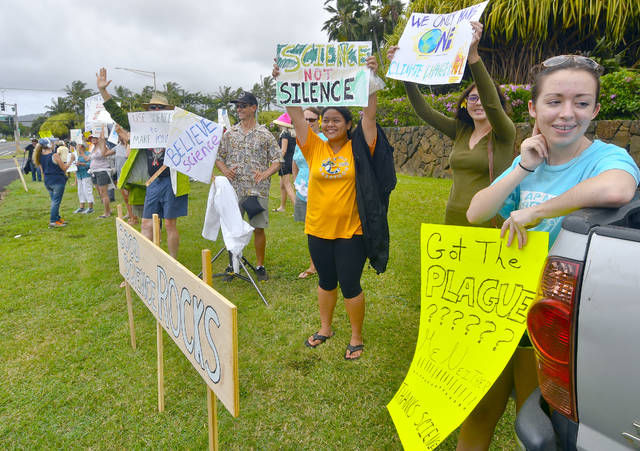LIHUE — A T-Rex wove its way through more than 300 people that attended the westernmost March for Science Saturday at the corner of Ahukini Road and Kapule Highway.
Representatives of island organizations, people with pets, parents with keiki, and visitors to the island all gathered on the corner for the same thing: to prove the value of science.
“We’re doing this demonstration, really, for art and science,” said Kauai geologist Chuck Blay. “It’s about discovery and then proving that discovery; it’s the core of who we are.”
The person in a T-Rex suit was one of several who attended the sign-waving event in costume, and Blay was one of many scientists who added their support.
He cited a divide between policy makers and the scientific method as the reason to draw attention to science in the form of Saturday’s March for Science, which was marked by demonstrations around the world supporting the main event in Washington, D.C.
“There’s a disconnect between science and policy-making, “ he said.
Another scientist at the march was Armin Korst, a cardiac researcher from the University of Colorado on vacation to Kauai. He was carrying a cardboard sign with an anatomically correct heart drawn in marker.
Korst stopped by the event to shed light on the discrimination recognizing the results of different types of science.
“People sometimes fight against science in terms of climate change,” Korst said. “But people aren’t questioning when someone opens up your chest, takes out your heart and puts a new one in there. That’s science, too.”
Fake news can be debunked with the scientific method, according to Tai Erum of Kapaa who joined the throng Saturday.
“We can refer to peer-reviewed papers and use science to find the truth, to figure out what’s real,” he said. “Science doesn’t require belief.”
Erum’s sign thanked science for vaccinations, space exploration, genetically modified food, renewable energy and the internet.
Evidence based science is important to the hunting, fishing and farming communities and that’s why Shyla Moon was representing the Hunting Farming and Fishing Association at the march.
“We need to support the scientific method,” Moon said. “We need science for everything.”
The Kauai chapter of Surfrider Foundation was represented by Robert Zelkovsky, because science protects the ocean and its users, and that jives with the Surfrider mission.
“Our water testing for bacteria and harmful chemicals is done scientifically,” he pointed out.
Increasing scientific literacy among those in the public education system and within politics is important to Gordon LaBedz, chair of the whale conservation group, Kohola Leo.
“Science is simply the method we use to find out what works and what doesn’t: facts versus fiction,” LaBedz said.
Support of the facts and use of the scientific method were some of the reasons that Nancy Kanna, one of the event’s organizers, decided to join the effort.
“This is the very first March for Science and there’s more than 500 of them organized today around the world,” Kanna said. “We need to support science for the future, and everyone that wants to be in science — diversity is key.”
She said the effort is made up of “a diverse group of science supporters, teachers, parents, students, scientists themselves, all global citizens joining together in a grassroots movement to celebrate and champion science’s role in society and in informing the policies that shape our present and future.”
Kalaheo sisters Elizabeth Borchelt and Karen Harlow attended the event to support science in education, and also to highlight the use of science in unraveling the past.
“I’m really into genealogy and that’s the science of DNA and family,” Harlow said. “It proves what you already know about yourself and inspires you to move forward.”
In the midst of it all, Lee Zeidner and her young child were holding up a piece of cardboard that said: “Protest Sine.”
“Science is about the cohesion of minds,” Zeidner said. “Once you have a collective consensus, you can have unity and when you have unity, you can have peace.”






